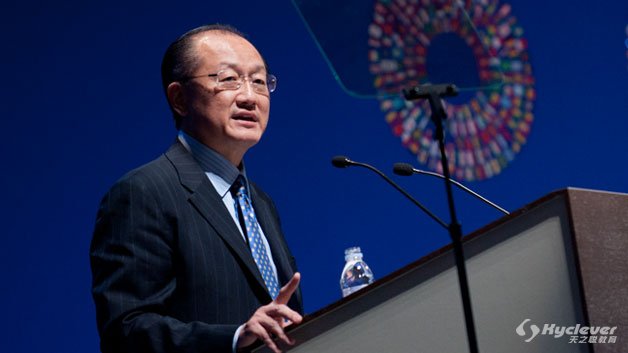
Delivering on Development: Harnessing Knowledge to Build Prosperity and End Poverty
交付发展成果:驾驭知识建立繁荣终结贫困
--Keynote Speech to World Knowledge Forum
——在世界知识论坛上的主旨发言
World Bank Group President Jim Yong Kim
世界银行集团行长金墉
Seoul, Republic of Korea
大韩民国 首尔
October 8, 2012
2012年10月8日
여러분 안녕하십니까!
고향에 돌아오니 기쁩니다. 장대환 박사님께서 이렇게 빛나는 자리를 베프시고
분에 넘치는 소개를 해 주시니, 마냥 겸손해지고 힘이 납니다. 참으로 고맙습니다. 강남스타일이 아니라도 즐겨주시기 바랍니다.
[Hello everyone! I am glad to be back home. I feel energized and humbled, thanks to the wonderful introduction from Professor Chang Dae-Whan, who has given us this wonderful occasion today. I appreciate it very much. Although my remarks won’t be “Gangnam Style,” please enjoy yourself!]
大家好!
我很高兴回家了!感谢张大焕教授的一番溢美之词,感谢今天这个美好的时刻,我感到十分激动和谦卑。我非常感谢。尽管这不是“江南Style”,请尽情享受吧!
Thank you very much your excellencies, distinguished guests, colleagues and friends, let me start off by making one other quick comment. In the front row is my 79 year old mother and she is here today to give a talk based on her life work studying Toegye, also known as Yi Hwang, one of the great philosophers in the history of Korea. And I just want to thank her for providing me with the desire and frankly the need to continue to push the boundaries of knowledge. We continue to push the boundaries of knowledge because we know it can make the world a better place.
非常感谢阁下、各位贵宾、同事们、朋友们。我首先想指出前排坐着我的79岁的老母亲,她今天来此介绍她终身致力于研究韩国历史上一位大哲学家退溪、也叫李滉的研究成果,我感谢她给了我不断拓展知识的疆界的愿望和需求。我们不断拓展知识的疆界,是因为我们知道这样做能使世界变得更美好。
Let me thank Dr. Chang Dae-Whan again for that generous introduction and for the invitation to address this remarkable gathering. And let me thank all of you for contributing to these three days of debate and learning. It is especially encouraging to see a strong presence of Korea’s private sector, whose pragmatism and adaptability have done so much to promote this country’s progress.
我再次感谢张大焕博士刚才的热情介绍,感谢他邀请我在这场盛会上发言。我也感谢在座的各位对这三天的辩论和学习的贡献。看到在座的有这么多韩国私营部门的代表使我备受鼓舞,韩国私营部门的务实主义与适配性对促进韩国的进步起了巨大作用。
It would be inspiring to address this group of leaders anywhere in the world. But above all here in Seoul: the city where I was born; the capital of a country that in 50 years has risen from poverty and conflict to become one of the world’s most prosperous and technologically advanced societies. Korea teaches us that development is possible even under the most extreme adversity. This lesson is more relevant today than ever.
在世界任何地方对这样一批领袖人物讲话都是令人鼓舞的,但在首尔尤其如此:这是我出生的城市;是一个在五十年时间内在贫困与冲突中崛起、跻身世界最繁荣和技术先进社会的国家的首都。韩国的例子教育我们,即使是在最极端的逆境中,发展也是可能的。这个道理今天比以往任何时候都更有意义。
The theme of this year’s forum urges us to recognize the magnitude of current global challenges, and above all to propose bold solutions. And it reminds us that bold action must be guided by knowledge.
今年论坛的主题敦促我们承认当前全球面临的巨大挑战,而首要任务是提出大胆的解决方案。它也提醒我们,大胆的行动必须由知识来引导。
But what kind of knowledge do we need?
但是,我们需要什么样的知识呢?
As we meet in this capital of a young economic and technological power, we are conscious that the world is changing. Our way of thinking about knowledge in development must also change.
当我们在这个年轻的经济和技术强国的首都聚会之际,我们很清楚,世界在变,我们对于发展知识的思维方式也必须随之改变。
60 years ago, when Korea was a poor country, and the World Bank had just been created, people thought power and development expertise could flow in only one direction: from the global north to south.
六十年前,韩国还是一个穷国,世界银行才刚刚成立,那时人们认为权力和发展知识只能单向流动:由“北”向“南”流动。
That model has vanished forever. This forum and the great city in which it takes place show that we live in a multipolar world. Power and knowledge springs from new sources and moves along new paths. Emerging economies now account for more than half of global economic growth.
这种模式已经永远消失。此次论坛和论坛召开的伟大城市都表明,我们生活在一个多极化的世界。权力和知识产生于新的来源,沿着新的路径行进。新兴经济体已达到全球经济增长的三分之二以上。
The global landscape is shifting in other ways. Movements such as the Arab Spring, the campaign of los Indignados, Occupy Wall Street, and social protests in many countries reflect people’s demand for participation and a fair share of the benefits of prosperity. These movements remind us that radical inequalities in wealth and power are not sustainable. In a world of informed, empowered citizens, economic strategies cannot be divorced from the demands of social justice.
世界格局在以其他方式发生变化。阿拉伯之春、西班牙的愤怒者运动、占领华尔街以及许多国家的社会抗议活动,反映出人民对参与和公平分享繁荣果实的要求。这些运动提醒我们,财富和权力的严重不均是不可持续的。在一个知情的、被赋予权力的公民社会中,经济战略不能与对社会公正的要求脱节。
Facing these challenges, governments and their partners can’t get away with rhetoric. We have to deliver results.
面对这些挑战,政府及其合作伙伴不能光说不做,我们必须交出成果。
Current development approaches will get us only part way there. At the turn of the millennium, Dr. Chang and others in this hall led a process that transformed Korea’s economy by deliberately placing knowledge at the center. I believe we need a similar evolutionary shift today, in how countries, communities and their partners harness knowledge for development.
目前的发展模式只能帮助我们实现部分目标。在本世纪初,张博士和在座的其他人有意把知识放在中心位置,领导了韩国经济的转型过程。我认为,今天,我们在国家、社区及其合作伙伴如何驾驭知识促进发展方面,也需要一个类似的转变过程。
At the center of our development model, we must lay the groundwork for a new kind of knowledge, what some have called a “science of delivery,” that countries will use to meet the demands of their people.
在我们发展模式的中心位置,我们必须为一种新型的知识奠定基础,有些人称之为“交付科学”,国家用以满足国民的需求。
My remarks today have three aims: first, to show why we need a science of delivery in development; second, to discuss some characteristics of delivery knowledge that will influence how this field takes shape; and third, to describe concrete steps the World Bank Group will take to strengthen our delivery work with countries and create foundations for the future full-blown science of delivery.
我今天的讲话有三个目的:第一,说明在发展中我们为什么需要一门“交付科学”;第二,讨论影响这个学科领域形成的交付知识的一些特点;第三,阐述为了加强同各国的交付工作和为未来创立交付科学奠定基础,世界银行集团将要采取哪些具体步骤。
As I speak with political leaders and partners in countries around the globe, I hear a recurring message.
在我与世界各国政治领袖和合作伙伴的交谈中,我经常听到一个信息。
Most countries know the broad policy directions they should adopt to reduce poverty and build prosperity. Many countries have strong, coherent development policies and programs—on paper. But they are not getting the results they want. In country after country, sector after sector, the greatest challenge is delivery.
多数国家都很清楚他们为减少贫困和建立繁荣应当采取的大的政策方向。各国都有宏大、连贯的发展政策和规划——在纸上。但是,他们未能获得预期的结果,纸上的规划在实地遭遇失败。一个又一个国家,一个又一个行业,最大的挑战就是“交付”。
“Delivery” is an elegant word for getting goods and services to people in a way that meets their expectations. High-performing private companies excel in delivery. Delivery is crucial for the public sector, too, as part of government’s social contract with citizens. Never before have we understood how much delivery is critical for development. Delivery priorities in development include material infrastructure like roads, power grids and water systems. They also include services like education, health care and social protection. Across all these areas, delivery lags today in many of the countries and communities where needs are greatest.
“交付”是一个优雅的词,用来形容以一种符合人民期望的方式提供货物和服务。绩效高的私营企业擅长交付。交付对于公共部门也同样非常重要,属于政府与国民之间的社会契约的一部分。交付对于发展至关重要。发展进程中的交付重点包括物质基础设施,譬如道路、电网和供水系统,也包括服务,譬如教育、医疗和社会保护。而今天,在所有这些领域,在最需要的很多国家和社区,交付却往往跟不上。
To improve development outcomes, we need to tackle delivery challenges head-on. This is the next frontier for the World Bank Group. This is, quite simply, what the people demand.
为了改善发展的结果,我们需要正面应对挑战。这是世界银行集团与各国合作的下一条战线。很简单,这是人民的要求。
We can point to individual examples of delivery success in countries at all levels of income. But we need to move from isolated examples to broad global progress, across all countries and all development sectors.
我们可以列举不同收入水平的国家的“交付”成功案例。但我们需要从孤立的个案上升到各国和各个发展领域的广泛的全球性进步。
To do this, we must work together to lay the foundations for a new field that will collect and distribute practical knowledge that countries can use to get delivery right in their unique contexts.
为达此目的,我们必须共同努力来为开创一个新的学科领域奠定基础,这个领域将收集和传播实用的知识,供各国用来在其独特的大环境中搞好“交付”。
There is an urgent need for a science of delivery in development, but that science does not yet exist. We must create it together. Countries will take the lead. The World Bank, the private sector, civil society, communities and global development partners will contribute. I urge all of you here, thought leaders and innovators from many backgrounds and many countries, to seize this challenge and contribute your ideas and energy.
发展事业迫切需要一门交付科学,但这门科学还不存在。我们必须一起来创建,国家带头,世界银行、私营部门、公民社会、社区和全球发展伙伴都出力。我敦促在座的各位、来自各种不同背景和许多国家的思想领袖们和发明家们,抓住这个挑战,贡献你们的想法和精力。
As we pursue the discussion, I want to be clear about the division of labor between countries and the World Bank Group. It is countries that deliver programs. What the Bank’s practitioners deliver is evidence-based support and advice to national policymakers, program implementers and private sector partners.
在我们开展讨论时,我想明确一下国家与世界银行集团之间的分工。国家是交付项目的。世界银行的从业者们所交付的是为国家政策制定者、项目实施者和私营部门伙伴提供基于实证的支持与建议。
In this context, “delivery” and “delivery failure” may seem like abstract concepts. Let’s take a moment to remind ourselves of what these ideas mean in human terms:
在这个上下文中,“交付”和“交付失败”似乎是抽象的概念。让我们花一分钟提醒一下我们自己,对人类来说这些概念意味着什么:
•Because of delivery failure, 1.3 billion people in developing countries lack access to electricity and remain shut out from virtually every benefit of modern life.
•由于“交付”失败,发展中国家有13亿人用不上电,与现代生活的一切好处隔绝。
•Because of delivery failure, more than 280,000 women each year die in childbirth from obstetric complications that modern medicine can easily address.
•由于“交付”失败,每年有28万多名妇女死于分娩时引起的产科并发症,而这种病现代医药很容易医治。
•Because of delivery success, the percentage of Tanzanian children completing primary school rose from 57 percent in 2000 to 90 percent in 2010, enhancing millions of children’s lives and giving them tools to achieve a more prosperous future.
•由于“交付”成功,坦桑尼亚儿童完成小学学业的比例从2000年的57%到2010年提高到90%,改善了数百万儿童的生活,赋予他们创造美好前程的工具。
The good news is that recent advances in many fields can help us improve delivery. Relevant insights are emerging in disciplines as varied as systems engineering, medicine, economics and other social sciences, and the business fields of strategy, operations and management. All these disciplines can feed evidence into an emerging field of delivery that will help countries improve development results.
有一个好消息是,近年来很多领域的进步可以帮助我们改善“交付”。系统工程、医药、经济学和其他社会科学,以及工商领域的战略、运营和管理等各个学科均产生了相关的研究成果。这些学科都可以为“交付”这门新兴学科提供实证,进而帮助各国改善发展的成果。
Let’s not forget that excellent delivery work is happening in many settings, much of the time. Private companies in all global regions solve delivery challenges every day to meet their clients’ needs. The public services we take for granted in a modern urban center—like electricity, water, and transportation networks—are also a daily demonstration of successful delivery.
我们不要忘记,在许多不同环境中,在大部分时间里,出色的“交付”工作都在发生。全球各地的私营企业每天都在为满足客户需求解决交付的问题。我们视为现代城市中心理应提供的公共服务——比如电、水和交通网络——每天也都在展示着成功的交付。
Effective implementers and high-functioning delivery systems are not that rare. But delivery has a paradoxical quality: the better it is, the less we notice it. This means that excellent delivery performance is often unrecognized, even by those who benefit from it directly. We underestimate the complexity of the challenges and the importance of implementers’ achievements. As a result, we don’t make adequate efforts to analyze delivery success, capture the knowledge that made it possible, and transmit the lessons of that success in forms that others can use.
有效的实施者和高性能的交付体系并非凤毛麟角。但交付有一个自相矛盾的特性:做得越好,越不被人注意到。这就意味着出色的交付绩效往往得不到承认,甚至得不到那些直接受益人的承认。我们低估了挑战的复杂性和实施者成就的重要性。其结果,我们没有做出足够的努力来分析交付的成功经验,吸收使其成为可能的知识,并以他人可以利用的形式传播成功的经验。
All of you here know the people in your company or organization who are the movers, the problem-solvers, the people the company calls in to handle the toughest cases. In fact, those of you here today are those people. Borrowing from my medical background, I like to call you people “master clinicians.” But we can simply refer to you as skilled implementers. Such implementers exist in every successful organization.
在座的各位都知道,在你们的公司或机构里谁是行动者,谁是解决问题的人,谁是公司叫来处理最棘手案子的人。事实上,在座的各位就是这样的人。借用我的医学背景,我喜欢把这些人称为“主治医师”。但是我们可以简单地把他们称作熟练的实施者。这样的实施者存在于每个成功的组织。
The foundation of success in delivery is the tacit knowledge that is present in the heads of these implementers. In the habits of effective action that have become second nature to them, what we might call their “muscle memory,” like the unhesitating movements of a musician executing a piece learned through tireless practice.
成功交付的基础是蕴藏在这些实施者头脑中的隐性知识。习惯成自然,有效的行动多年来已成为他们的第二天性,我们可以将其叫作“肌肉记忆”,就像音乐家在弹奏一首经过苦练掌握的曲子时动作果断毫不迟疑。
Development implementers working on the front lines acquire this “muscle memory” over the course of a career. They test solutions, observe the results, make corrections, test again. As they go through many of these learning cycles, their accumulated experience becomes practical know-how. In most cases where countries and partners achieve good development outcomes, it’s actually this tacit implementer know-how that is driving the success.
在前线工作的发展实施者在职业生涯中获得了这种“肌肉记忆”,他们测试解决方案,观察结果,做出纠正,再次测试。他们通过多次重复这种学习周期,他们积累的经验变成了实用的专业知识。国家及其合作伙伴取得良好的发展成果,在很多情况下实际上正是这种实施者的隐性知识推动了成功。
The challenge is to move from excellence in individual performance to broad improvements in the quality of delivery across whole sectors.
我们面临的挑战是从卓越的个人表现提升到整个行业交付质量的普遍改善。
For that, we must advance from the experiential know-how of individual practitioners to the level of analytical knowledge—the level of science. We must analyze and compare the performance of large numbers of implementers. We must connect implementers’ experiences and results to contextual data on politics, social conditions, country capacities, and other factors that affect delivery outcomes. We must create effective mechanisms to share delivery knowledge, so that implementers can continuously learn from each other. And we must set up “virtuous cycles” of learning, in which practitioners continuously test innovations, capture results, and use these results to design new experiments. These are steps toward a science of delivery.
为此目的,我们必须从个体从业者的知识经验提升到分析知识的层面,即科学层面。我们必须分析和比较大量实施者的绩效。我们必须将实施者的经验和成果与有关政治、社会状况、国家能力以及其他影响交付结果的大环境因素联系起来。我们必须创造共享交付知识的有效机制,从而实施者可以不断地互相学习。我们必须建立学习的“良性循环”,以利实施者不断地测试创新,取得成果,并利用这些成果来设计新的实验。这就是创建交付科学的步骤。
Until we take those steps, delivery science itself faces a delivery failure, in that the bulk of implementer innovation is never properly evaluated, analyzed and made available for shared learning. We’re losing opportunities to spread success. It’s time to end this waste of development know-how, and to make sure poor people everywhere have access to every innovation that might help them improve their lives.
在我们采取这些步骤之前,交付科学本身也面临交付失败,对实施者的创新从没有进行适当的评估、分析和用于学习共享。我们丧失了传播成功经验的机会。应该立即停止这种对发展知识的浪费,确保各地的贫困人口都能获得有助于他们改善生活的各种创新。
I want to highlight four features of delivery that are especially important for how we’ll work to build the field and realize its potential.
我想着重谈谈交付的四个特点,这些特点对于我们如何努力创建交付学科领域和实现其潜力尤为重要。
First, delivery is about problem-solving. It is a practical brand of knowledge that looks for the most effective means to achieve a defined end.
首先,交付是关于解决问题,是一种实用的知识品牌,其目的是探寻达到一个既定目标的最有效的手段。
An important consequence is that delivery is highly context-sensitive. Solutions are determined by the needs and opportunities of a specific time and place.
一个重要的结果是交付极易受到大环境的影响。解决方案取决于特定时间和地点的需要与机遇。
This is why the World Bank Group will work with country implementers and communities to build the delivery knowledge base from the ground up. And this is where the Bank’s sustained, on-the-ground presence in more than 120 countries will be crucial. The World Bank will support countries to launch local delivery knowledge hubs focused on local problems; and we’ll connect these country platforms to regional and global resources. Delivery knowledge hubs may take different forms and operate in different ways. Their purpose is to help countries learn systematically.
这就是为什么世界银行集团将与国家实施者及社区一起,从头开始建立交付知识基础。这也是世行坚持不懈地在120多个国家实地运作的重要意义。世界银行将支持各国启动专门研究本地问题的交付知识中心;我们也会将这些国家平台与地区及全球资源联系起来。交付知识中心可以采用不同形式,以不同的方式运作,其目的就是帮助国家系统地学习。
The context-dependence of delivery also means that programs often give disappointing results because of contextual factors that are beyond implementers’ direct control. Lack of high-level political support for the program; inadequate financing; and weak country administrative capacities are examples. One task for a science of delivery will be to identify strategies that in some cases have enabled implementers to partially relieve these external constraints, or at least limit their impact on program performance.
交付对大环境的依赖性也意味着,由于大环境因素超出实施者的直接控制范围,项目产生的结果常常令人失望。缺乏高层对项目的政治支持;资金不足;国家行政管理能力薄弱,这些都是例子。交付科学的一项任务是确定战略,使实施者在某些情况下能够摆脱部分大环境制约因素,或者起码能抑制这些因素对项目绩效的影响。
A focus on local problem-solving does not mean that context-specific knowledge cannot be aggregated to feed into the global pool of experience and evidence. There is a virtuous link between the local and the global whereby knowledge that is relevant to one context can be adapted in other contexts. The key is to evaluate rigorously, so that local knowledge gets transformed into evidence available to others. The World Bank Group can play a crucial role as knowledge broker in this exchange: first by supporting local innovation in delivery, and then by making sure that local results are evaluated and aggregated as globally accessible evidence. Our work in supporting the collection and dissemination of evidence on Conditional Cash Transfer programs is one example. Since Cash Transfers were first launched by Brazil and Mexico in the late 1990s, the Bank has facilitated more than 200 South-South knowledge exchanges that have helped countries learn from each other how best to implement these programs.
专注于解决本地问题,并不是说对本地知识不能加以整合纳入全球经验实证库。在本地和全球之间存在良性链接,通过这种链接,一种大环境下的相关知识可以与其他大环境进行适配。世界银行集团能在这种交流中作为知识经纪人发挥重要作用:首先是通过支持交付领域的本地创新,然后确保对本地成果进行评估和整合为可供全球各地利用的实证。我们在支持有条件现金转移支付项目方面的实证收集和传播工作就是例子。现金转移支付于上世纪90年代起始于巴西和墨西哥,世行协助开展了200多次南南知识交流活动,帮助各国交流如何以最佳方式实施此类项目。
Second, delivery is concerned with complex systems. Delivery in development addresses social goals. Societies are composed of interpenetrating systems. To achieve any social aim, we have to engage multiple natural and human-made systems that mutually influence each other.
第二,交付关系到复杂的系统。发展事业的交付针对的是社会目标。社会是由相互穿透的系统构成的。要想实现任何社会目标,我们必须介入多种相互影响的自然和人为的系统。
Many low-income countries face capacity constraints, and their systems are weak. But building and managing complex systems is where the World Bank Group excels. For more than 60 years, we’ve been helping countries around the globe design and operate systems to deliver on social goals. We can analyze a delivery system in its totality, pinpoint capacity gaps and bottlenecks, and identify intervention points. As we work with countries to build the science of delivery, these are the issues we’ll be tackling, bringing to bear our existing systems knowledge and applying it in new ways.
许多低收入国家面临能力制约,他们的系统薄弱。但建立和管理复杂的系统正是世界银行集团擅长之道。60多年来,我们一直在帮助世界各国设计和操作实现社会目标的系统。我们能够从整体上分析一种交付系统,指出能力差距和瓶颈所在,确定干预点。在我们与各国合作建立交付科学时,这些都是我们要解决的问题,可以利用我们现有的系统知识,以新的方式加以运用。
To encompass the complexity of delivery challenges, a future delivery science will have to be multidisciplinary from the outset. This is my third point. Delivery learning will draw on the natural sciences; the social sciences; engineering and applied mathematics; and the business disciplines; but also humanities fields like history and ethics.
考虑到交付问题的复杂性,未来的交付科学必须从一开始就是多学科的。这是我要讲的第三点。交付学习将吸收借鉴自然科学、社会科学、工程和应用数学、工商学科以及历史、伦理等人文学科等各方面的知识。
When Professor Michael Porter and I built the Global Health Delivery project at Harvard, we studied health systems challenges. We found that, to get a deep reading on health systems, the best approach was to send out multidisciplinary research teams that included doctors and public health specialists, but also anthropologists, management experts, historians, journalists and ethicists. Triangulating different forms of data helped us discover what was driving success or failure in the programs we analyzed.
迈克尔·波特教授和我在哈佛大学建立“全球卫生交付”项目时,我们研究了卫生系统面临的挑战。我们发现要想深刻理解卫生系统,最佳方式就是派出多学科的研究团队,团队成员包括医生和公共卫生专家,也包括人类学家、管理专家、历史学家、新闻记者和伦理学家。对各种形式的数据进行三角剖分,帮助我们发现了导致所分析项目成功或失败的原因。
One of the World Bank Group’s distinctive strengths is our ability to combine depth of knowledge in key development fields with multidisciplinary breadth. We can mobilize in-house expertise across a wide span of disciplines. And through our convening power and networks, we can connect our clients to an even wider array of international expertise beyond our own institution.
世界银行集团的一个独特优势是我们将主要发展领域的知识深度与多学科的广度相结合的能力。我们能够从内部调动各种不同学科的专业知识。通过我们的召集力和网络,我们也能够将客户与世行之外的更广泛的国际专业知识联系起来。
Fourth, delivery knowledge is interactive and evolving. It differs from what we’re used to in disciplines that are more quantitative and abstract, less context-dependent.
第四,交付知识是互动和发展的,它不同于我们所习惯的定量的、抽象的、不受大环境影响的学科。
Because delivery solutions change with the context, delivery knowledge is constantly renewed through dialog among practitioners and stakeholders. Delivery principles emerge in collaboration and communication, as people and institutions problem-solve together.
由于交付解决方案随着大环境而改变,交付知识通过从业者和利益相关者之间的对话而不断更新。因为人和机构共同解决问题,所以交付的原则产生于合作与沟通。
Delivery knowledge is “social” knowledge in a way that traditional forms of scientific knowledge have not always been.
交付知识是一种不同于传统形式的科学知识的“社会”知识。
Here’s an example of what this means in practice. In the 1980s, efforts to raise child survival rates in poor countries had stagnated. Millions of children were dying each year from diseases that could be prevented or cured with simple, cheap technologies, including vaccines. But delivery of these simple interventions had stalled.
我举一个例子来说明这在实践中是什么意思。在上世纪80年代,提高贫困国家儿童存活率的努力停滞不前。每年有数百万儿童死于采用疫苗等成本很低的简易技术就能预防或治愈的疾病。但这些简易的干预措施的交付却陷入困境。
Leading agencies, in particular WHO and UNICEF, realized they needed a dramatic change in strategy. The solution was to create a task force made up of experienced implementers, whose authority all the agencies accepted. People like Bill Foege, a teacher of mine who had driven major parts of WHO’s historic smallpox eradication campaign. The new group was called the Task Force for Child Survival and Development. Essentially, it was a delivery workshop. Many of the group’s meetings were intensive problem-solving sessions. Participants identified delivery bottlenecks that were blocking progress in countries and used their collective experience to find solutions.
主导机构、特别是世界卫生组织和联合国儿基会意识到,他们需要大刀阔斧地改变战略。解决办法是成立一个由经验丰富的实施者组成的特别工作组,其权威被各机构所接受。像比尔·佛吉这样的人士,他是我的老师,他在很大程度上推动了世卫组织具有历史意义的消除天花运动。这个新的小组叫作“儿童存活和发展特别工作组”。从本质上说,它就是一个交付研讨会。该小组的许多会议都是集中解决问题的会议。与会者明确阻碍各国交付的瓶颈,利用他们的集体经验来寻找解决方案。
The Task Force changed history. In just six years, from 1984 to 1990, childhood vaccination coverage in developing countries soared, quadrupling from 20 to 80 percent, by some estimates. What was the secret? The technologies involved had long been known. What had been missing was a framework for joint learning and decision-making among master implementers. The key was interactive problem-solving, with a laser focus on results. These are the kinds of models we’re looking for.
这个特别工作组改变了历史。在短短六年里,即1984~1990年,发展中国家的儿童免疫覆盖面迅速扩大,据估计从20%扩大到80%,扩大了三倍。诀窍何在?采用的技术我们早已熟知,缺少的是一个主要实施者共同学习和决策的框架。关键是互动式解决问题,聚焦结果。这就是我们寻求的模式。
One consequence of the interactive nature of delivery knowledge is that the quality of our knowledge depends on the inclusiveness of the debate. Excluding shareholders from the conversation deprives us of critical data. Thus, if grassroots community voices aren’t heard, our understanding of delivery processes will be distorted and incomplete. In our delivery work, the World Bank Group and our country partners will reinforce the participation of beneficiary communities in all facets of program design, implementation, monitoring and evaluation.
交付知识的互动性带来的一个结果是,我们知识的质量取决于辩论的参与性。将股东排除在对话之外,我们就得不到关键的数据。因此,如果听不到草根社区的声音,我们对交付过程的理解就会扭曲和不完整。在我们的交付工作中,世界银行集团和我们的国家合作伙伴将要加强受益社区在项目设计、实施、监测和评价等各个方面的参与。
Let me turn now to describe three practical steps the World Bank Group will take, to strengthen our delivery collaboration with countries, and lay the groundwork for the science of delivery.
现在我来描述一下为了加强我们与各国的支付合作,为支付科学打下基础,世界银行集团将要采取的三个实际步骤。
First, the World Bank Group will support an initial wave of three self-selected countries to create national delivery knowledge hubs for development. These hubs will coordinate people and resources to tackle priority national delivery problems and disseminate learning. Countries will structure their hubs in accordance with their national agendas. In most cases, hubs will be based within existing public or private institutions. Some may be entirely “virtual.” If countries request, the Bank will provide start-up financing, technical assistance, and support for knowledge-sharing and dissemination.
首先,世界银行集团将在首批支持三个毛遂自荐的国家建立国家发展交付知识中心。这些中心将协调人员与资源,解决国家支付的优先重点问题,传播知识经验。国家将根据本国的议程设计中心的架构。在多数情况下,中心将设在现有的公共或私营机构内。有些可能完全是“虚拟”的。如果国家提出要求,世行会提供启动资金、技术援助以及知识共享与传播方面的支持。
I am pleased to announce that Minister of Finance Pravin Gordhan of South Africa has confirmed his country’s intention to be the first pilot country. When I visited South Africa last month, President Zuma, Minister Gordhan and other leaders were clear that improving delivery in core infrastructure and social sectors was their top national priority. Delivery is the key to reaching South Africa’s goal of inclusive prosperity, and the government is determined to do whatever it takes to get there. The World Bank Group looks forward to working with South Africa as the country tackles this historic challenge. We encourage other interested countries to contact us.
我很高兴地宣布,南非财政部长普拉温·戈尔丹已确认南非打算成为第一个试点国家。我上月访问南非时,祖马总统、戈尔丹部长和其他领导人都明确表示,改善核心基础设施和社会部门的交付是国家的首要任务。交付是实现南非包容性繁荣目标的关键,政府决心为此不惜采取任何措施。世界银行集团期待着与南非合作,帮助南非应对这个历史性的挑战。我们也鼓励其他有兴趣的国家联系我们。
Second, we’ll refocus the Bank’s measurement work to better support progress in delivery. Specifically, to know if delivery is working, output indicators are not enough. We’ve got to measure results. Not just how many kilometers of rural roads get built, but whether the roads are helping reduce poverty. Not just how many children are in school, but whether they’re learning. In recent years, the Bank has taken steps to incorporate more outcomes measures in our project data collection. We’re committed to expand this approach. We will invest in tools and strategies to collect outcomes data that can inform country decisions around delivery for better results.
第二,我们将调整世行评估工作的关注点,以便更好地支持在交付方面取得进步。具体而言,想要知道交付是否成功,仅靠产出指标是不够的。我们必须要衡量结果。不仅要知道修了多少公里的乡村道路,而且要知道这些路是否有助于减少贫困。不仅要知道有多少孩子上学,而且要知道他们是否真正学到了知识。近年来,世行采取措施将更多的成果衡量指标纳入我们的项目数据收集范围。我们承诺要推广这种模式。我们将投资开发收集成果数据的工具和策略,以便为改善交付成果的国家决策提供依据。
Third, we’ll use innovative approaches and tools to capture the tacit knowledge of master implementers and teach delivery skills. We’ll apply a range of strategies. Three of these approaches are case-based learning; “clinical mentorships”; and a commitment to learning from failure.
第三,我们将采用创新方法和工具来吸取实施大师的隐性知识,传授交付技能。我们将运用各种策略。其中三种方法为:案例教学、“临床指导”和从失败中学习。
A proven tool for teaching practitioners about complex systems is the case study method used in business, engineering and health sciences schools. The case method uses a narrative model that avoids reducing complex situations to simplistic schemas. At Harvard, we found that the case method is an extremely effective way to study how global health decision-makers, for example, navigate complex systems. At the World Bank Group, we’ll build a library of delivery case studies and use these as a resource for training Bank staff and country implementers who want to take advantage of this opportunity. We will invite our partners from throughout the world to contribute to what we hope will be a rapidly expanding case library.
案例教学法是向从业者传授复杂系统相关知识的一种经实践证明有效的工具,在工商管理、工程和医学院广泛采用。案例教学法采用一种叙事模式,避免将复杂的情景简单化。在哈佛大学,我们发现案例教学法是研究比如全球卫生部门决策者如何操作复杂系统的一种极其有效的方式。在世界银行集团,我们将建立一个交付案例研究图书资料馆,用其作为培训世行员工和希望利用这一机会的国家实施者的资源。我们还将邀请各国的合作伙伴为这个案例图书资料馆作贡献,希望它能迅速扩大规模。
We’ll also create a mentorship program to build the next generation of master implementers within the World Bank Group. This program will assign promising young professionals to work with seasoned implementers. Master implementers will transmit their know-how through collaborative work tackling real problems for real clients.
我们还将创立一个导师计划,目的是在世界银行集团内部培育新一代交付人才。这个项目将安排年轻有为的专业人才与经验丰富的实施者一起共事。通过共同为真正的客户解决真正的问题,实施大师可以传授他们的专业知识。
A third learning approach is especially important to me.
第三种学习方法对于我尤其重要。
Historically, development institutions have been reluctant to acknowledge failures, much less analyze them publicly. But that’s exactly what we’re going to do at the World Bank Group.
从历史上来看,发展机构都不愿意承认失败,更不愿意公开分析失败的原因。而这正是我们世界银行集团所要做的事情。
Policies and projects that go wrong carry valuable lessons. But institutions are often wary of revisiting them to learn these lessons. How can we avoid repeating past mistakes, if we don’t talk about those mistakes openly, diagnose what went wrong, and share our findings, so others can avoid the same traps?
出现失误的政策和项目都有宝贵的经验教训。但机构往往小心翼翼,不愿意重新审视这些政策和项目以吸取经验教训。如果我们不公开讨论错误,分析错在何处,分享研究结果,我们又怎能避免重蹈覆辙?别人又怎能避免落入同一陷阱?
I want the World Bank Group to set an example for the development community. Here again, we will build on promising precedents. Many Bank staff have already participated in discussions called “Failfairs,” which explore why specific projects fell short of expectations. I want to expand these events, make them more systematic, and disseminate the results.
我希望世界银行集团为发展界树立一个榜样。我们要以好的先例为基础。很多世行员工都已参加了 “Failfairs”(失败教训研讨会)的活动,探讨特定项目未能达到预期的原因。我要扩大这些活动的规模,将其制度化,传播研讨结果。
I will start chairing these workshops personally. The first is scheduled for early December. These sessions will not place blame on staff. Instead, they will let us collectively understand the factors that caused good intentions to yield less than satisfactory results. Going forward, we’ll broaden participation in these exercises to include affected communities and outside critics, and we’ll publish the proceedings and conclusions.
我将亲自主持这些研讨会。第一场研讨会定在12月初。这些研讨会不会指责员工。相反,员工会让我们一起了解项目未能达到预期产生满意的结果原因何在。展望未来,我们将扩大这些活动的参与面,让受影响的社区和外部批评人士也加入进来,我们还要发布会议纪要和结论。
In closing, I want to return to the heart of the World Bank’s work: our relationship with countries and with the poor. I believe our work together building the science of delivery will contribute to a fundamental evolution in this relationship.
最后,我想回到世界银行工作的核心:我们与国家、与贫困人口的关系。我认为,我们共同努力建立交付科学,将推动这种关系发生根本性的变化。
I’ve talked about the collaborative, interactive nature of delivery learning. For some time now, the Bank and its clients have been growing from a traditional relationship of lender and borrower, towards a true partnership in implementation and learning, where we link our skills to pursue evidence-based action around common goals.
我谈到了交付学习的协作性和互动性。一段时间以来,世行与客户的关系已从贷款方与借款方的关系朝着实施与学习方面的真正合作伙伴关系的方向演变,在这种关系中,我们联系各自的技能,围绕共同的目标,采取基于实证的行动。
The science of delivery is a catalyst that will speed this shift. Beyond providing money and knowledge, the World Bank Group will be an organization that innovates, co-creates and learns together with its clients.
交付科学是一种催化剂,会加快这种转变。除了提供资金和知识,世界银行集团将成为一个与客户共同创新、创造和学习的组织。
At the same time, the Bank also serves its partners by doing something that none of them can do in isolation: creating knowledge-related global public goods that support shared learning processes at global, regional, national and subnational levels.
与此同时,世行也为合作伙伴服务,做一件他们无法单独完成的事情,即,创造与知识相关的全球公共物品,支持全球、区域、国家和国家以下层面的共同学习过程。
I’ve discussed delivery science with political leaders from around the world. Their reaction is often relief that global partners are finally catching on. Countries have been grappling with these challenges for years, and they know the stakes are high.
我与世界各国的政治领袖们探讨了交付科学的问题。他们的反应往往是舒了一口气,全球合作伙伴终于明白了。多年来各国都在努力应对这些挑战,他们知道事关重大。
Looking beyond today’s economic uncertainty, many leaders in government, the private sector and civil society remain committed to bold objectives for reducing poverty and building prosperity. They are right to maintain their ambitious aims. And countries are right in seeing that delivery will often spell the difference between stagnation and growth.
超越今天的经济不确定性而展望未来,政府、私营部门和公民社会的许多领导人继续致力于减少贫困和建立繁荣的大胆目标。他们坚持雄心勃勃的目标是对的。各国认识到交付往往决定着停滞与增长之间的差别。
Together, we’ll open a new chapter in development: an era in which we will continuously improve our ability to deliver on our promises to the people, especially to the poorest.
我们共同开创发展的新篇章:一个新时代,在这个新时代,我们将不断提升能力,以履行对人民、特别是对最贫困者的承诺。
Thank you very much.
谢谢各位。
 WORLD BANK
WORLD BANK
 2012-10-14
2012-10-14
 WORLD BANK
WORLD BANK
 484次
484次


 点赞(0)
点赞(0)

 收藏
收藏
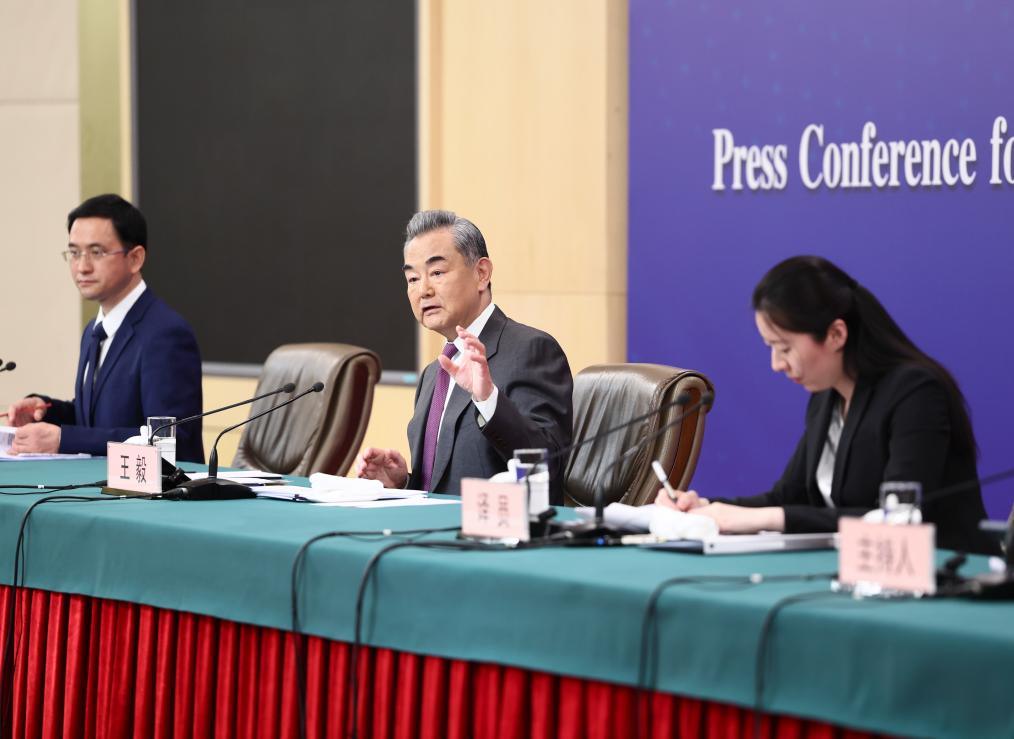
 收藏资讯
收藏资讯
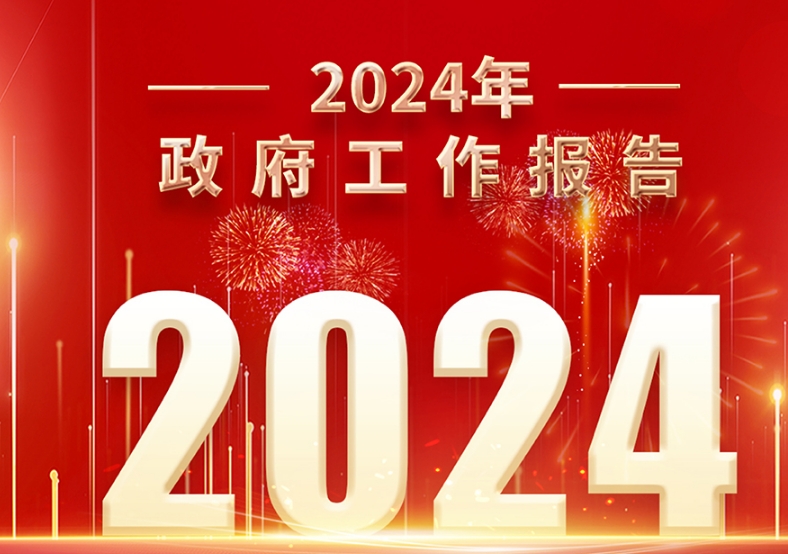
 收藏资讯
收藏资讯
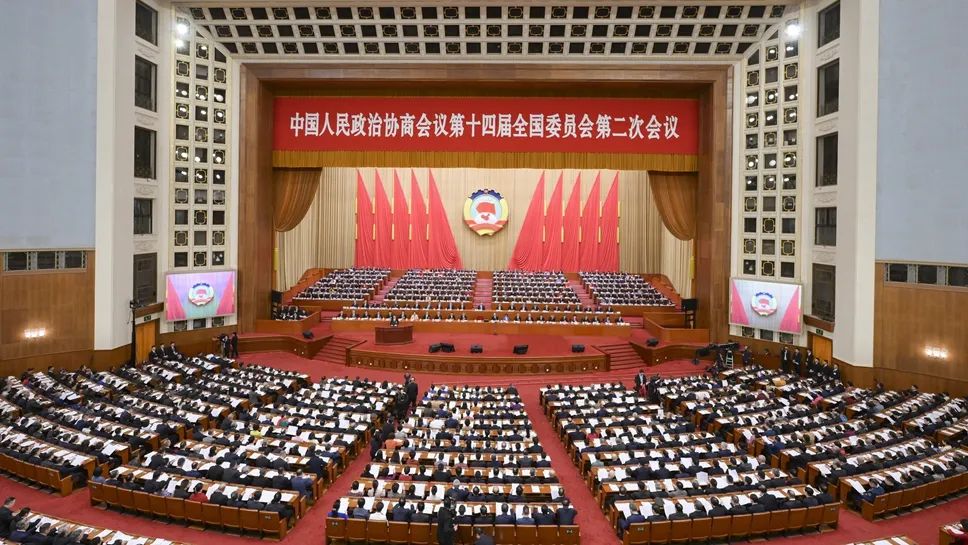
 收藏资讯
收藏资讯
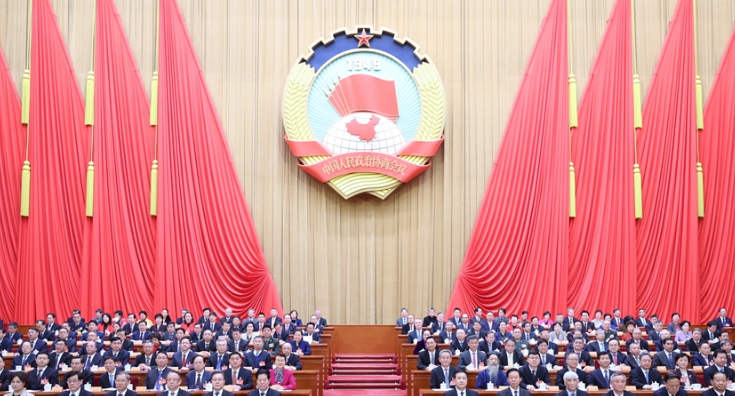
 收藏资讯
收藏资讯